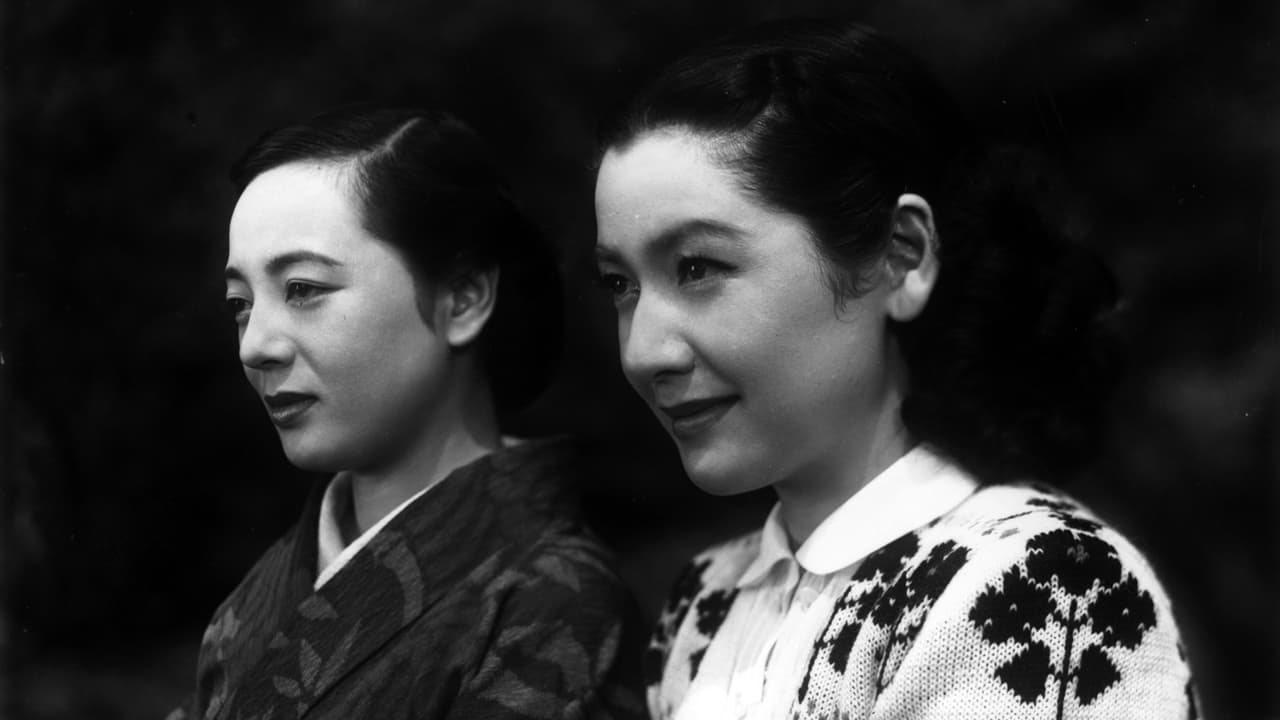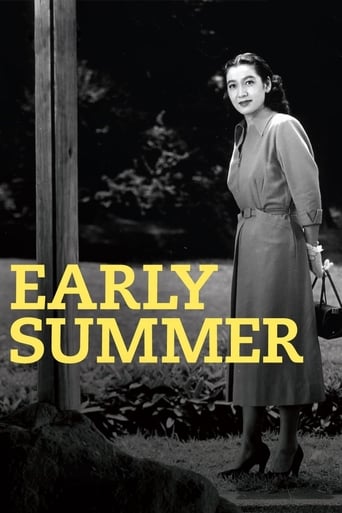

My second foray into Ozu's canon, EARLY SUMMER is two years prior to TOKYO STORY (1953), the story customarily hinges on an extended household of Mamiya with Ozu's homegrown cast, and its material can be readily read as a prequel of TOKYO STORY with small identity and cast tweaks.Shukichi (Sugai) and Shige Mamiya (Higashiyama) are an elderly couple living in their suburban home near Tokyo along with the family of their eldest son Koichi (Ryû, who would in two years, take Sugai's mantra to play the husband of Higashiyama in TOKYO STORY), a physician who is married to Fumiko (Miyake) and they have two young boys, also living under the same roof is Koichi's unmarried sister Noriko (Setsuko Hora, who passed away merely last year at the venerable age of 95), who takes the centre stage in the story, since her marriage prospect will inevitably change the status quo of this harmonious family.Noriko is 28 years old, chirpily enjoys her bachelorette days, she works as an office secretary of Mr. Satake (Sano), and is thick as thieves with her unmarried school-days friend Aya (Awashima). At home, she is in good rapport with everyone, Fumiko especially. Apparently, it is the best time of the family, as Shukichi sighs with a dash of melancholy (they have another son, who has been presumably missing in the war).Mr. Satake recommend a promising 40-year-old bachelor businessman to Noriko as her potential husband-to-be, she equivocates, but the family is motivated, Koichi begins to do some background research of the candidate, which turns out quite satisfactory in his view, but Shige holds her reserve about their age difference, and it ruffles Koichi's feathers, in his defence, Noriko is not a young maiden anymore, she shouldn't be too picky either (a reactionary bias on women, still today). A discord is nimbly instigated but the irony is, Noriko doesn't even have the intention to meet the hopeful at the first place, and before soon she will shock and disappoint the family with her own choice of her future husband, which suggests a lot of hardship is in the offing for her.Even for an Ozu novice like myself, it is not difficult to discern his salient exercise of narrative lacunae, whether it is the conversation between their neighbour Tami (Sugimura) and Shige about a private detective asking about Noriko, interrupted by Shukichi's emergence and never resumes itself, or a clear shot of the said hopeful in person when Noriko and Aya are emboldened for a playful peep, even Noriko's marriage ceremony, has never be shown directly on the screen. Ozu is a master of eliding hectic actions and prefers using words, even small talks to fill the missing pages, an expedient move to facilitate the shooting and preserve his stationary style, yet, the story never slumps into monotony, all owing to the industriously composed script inundated with insightful rumination and realistic precision, penned by Ozu and his long-time collaborator Kôgo Noda.Setsuko Hara, is forever enthralling in her good-natured etiquette and photogenic effervescence, she is the ultimate screen emblem of oriental warmth and optimism, even in the single-ladies-vs.- married-women bickering, she radiates benevolence without betraying any grudge. Here, her Noriko also epitomises a modern, more independent image of a younger generation of Japanese women after WWII, no longer curbed by family persuasion, extraneous influence or social pressure, they learn to be in the driver's seat in their own lanes.Chishû Ryû, plays the peer of Hara, and Haruko Sugimura, plays her elder here, both would switch their social hierarchy in TOKYO STORY, an undeniable testimony of their uncanny and fluid versatility, along with a studious supporting cast dutifully verbalises their dialogues verbatim and gestures to a nicety. Elucidating eloquently Ozu's thematic concerns of social and familial changeover, individual awakening and humane poetry, EARLY SUMMER, is without doubt on a par with TOKYO STORY in every aspect, and mesmerises new audience to ask for more from Ozu's treasury.
... View MoreViewed on DVD. Film historic relevance = nine (9) stars; restoration = seven (7) stars. This is one co-writer's/director's conception of the dreary life faced by the lowest tiers of salary men and women (i.e., corporate clerks and clerk/typists) at the start of (mid 1950's) Japan's stunning post-war recovery. The parallels between life in the military and life in post-war corporate Japan seem pretty obvious from several carefully staged shots at the start of the film. Nevertheless, the director insists on hammering away at this similarity throughout the movie (in case there are some really slow-to-comprehend viewers?). The cast is lead by a group of excellent actresses who occupy all the staring roles. They uniformly deliver excellent line readings, and create the strongest impressions. All male actors play DE FACTO supporting roles. Exteriors (real, not studio simulations) are numerous, and document many contemporary, ever-day activities in suburban and urban Japan. By far these are the most fascinating scenes in the film. This includes scary shots of scores of commuters jammed together waiting for trains and standing at the VERY EDGE of station platforms without protective barriers of any kind. These are priceless views of continuing societal trust in the midst of momentous and far-from-popular cultural changes. The film (as usual for this director) is much too long. This time out the director surpasses himself with shots of clothes lines! There are at least a dozen of them. The usual shots of ugly overhead power lines are also present. There are clever in-camera exterior shots using miniature high-rise building with each window showing the same inside activity. You have seen most/all of the real building facades (photographed from the same angles) before. Likewise for seaside location scenes. Film "score" is chaotic, tedious, and usually inappropriate for (or disconnected from) what appears on screen. The music basically distracts from rather than adds to the impact of the movie. Happy music endlessly looped during a solemn wake is not particularly amusing! And it is the exact same ripped-off Italian cinema music used in other films by this director. Also if you are a huge fan of xylophones, then this film's music is for you! Restoration including subtitles is not quit there. Frame jitters occurs especially during the opening credits. Subtitles (even ones with a few words) appear before the dialog is delivered (a frequent echo-like irritation). None of the prominently photographed signs (on doors, buildings, etc.) are subtitled. If you are a Japanese culture buff, then this is a must movie. Otherwise, more on. WILLIAM FLANIGAN, PhD.
... View MoreI had seen Tokyo Story and respected it. But Early Summer is a charming, poignant and very human movie that stands the test of time. It is the story of Noriko, a 28-year-old administrative assistant who is under pressure from her family to marry. To put this in perspective, in traditional Japan, a woman married by age 25, or she was considered a "Christmas cake "-- nobody wanted it after the 25th! It is not as common in Japan now for women to face such pressure, especially since so many Japanese women are choosing to stay single, now that they have the money to be independent. However, Noriko's case would have been common up until the current generation of women.While the war is not a character in the movie, there are threads that connect Early Summer to World War II. The movie takes place in 1951, just before Japan emerged from the U.S. occupation, and before Japanese society had its great explosion of wealth in the 1960s. It is a snapshot of a time that no longer exists, although the family conflicts are universal. I plan to add Early Summer to my list of top movies and look forward to viewing it again.
... View MoreThe style and pacing of Bakushu is similar to Tokyo Story but unlike the latter, Bakushu's central theme of arranged marriage over individual choice seems awfully dated and for this reason the film does not rank as highly as Tokyo Story. At the end of Tokyo Story both my wife and I felt compelled to examine our relationship(s) with our respective parents. The theme of Tokyo Story (sons and daughters relating to aging parents) is much more universal and therefore much easier to identify cross-culturally. Although the concern the entire family shows for the daughter Noriko's marriage may seem unusual to western viewers it is still very much a reality in many parts of Japan. Once this can be realized or accepted then Bakushu can take on the same poetic beauty that can be found in all of Ozu's work. The cinematic style is another thing altogether and may take a lot of getting used to as will the sure volume of characters which is probably five times as many as can be found in most western films. Ozu bears repeated viewing as his subtlety and outrageously awkward camera placements are an acquired taste but for those who persevere there are many rewards.
... View More